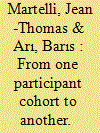| Srl | Item |
| 1 |
ID:
174676


|
|
|
|
|
| Summary/Abstract |
More urgently than ever we need an answer to the question posed by the late Mick Moran in The Political Quarterly nearly two decades ago: ‘if government now invests huge resources in trying to be smart why does it often act so dumb?’. We reflect on this question in the context of governmental responses to Covid‐19 in four steps. First, we argue that blunders occur because of systemic weaknesses that stimulate poor policy choices. Second, we review and assess the performance of governments on Covid‐19 across a range of advanced democracies. Third, in the light of these comparisons we argue that the UK system of governance has proved itself vulnerable to failure at the time when its citizens most needed it. Finally, we outline an agenda of reform that seeks to rectify structural weaknesses of that governance capacity.
|
|
|
|
|
|
|
|
|
|
|
|
|
|
|
|
| 2 |
ID:
160687


|
|
|
|
|
| Summary/Abstract |
Several recent studies propose that political choices of Indian youth can hardly be distinguished from those of their parents in many respects. Contrary to this well-established understanding, this article shows that when set apart from the spheres of family and work, students in a flagship Indian university—mostly in the social sciences and humanities—gradually transform their political attitudes in light of prolonged exposure to a campus environment. Through combining ethnographic study with the analysis of a survey of political attitudes of Jawaharlal Nehru University (JNU) students, we show that time spent in situ fosters participation to political activities, increases chances of joining a student organization and make students more likely to identify themselves as politically radical. The class and caste background of students, on the other hand, are not strongly associated with political attitudes, showing the integrative nature of politicization on the JNU campus.
|
|
|
|
|
|
|
|
|
|
|
|
|
|
|
|